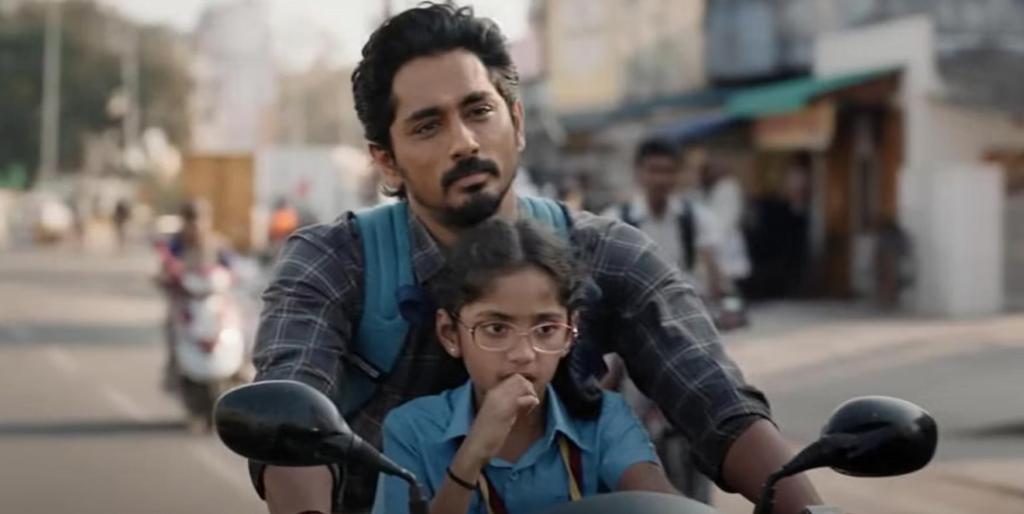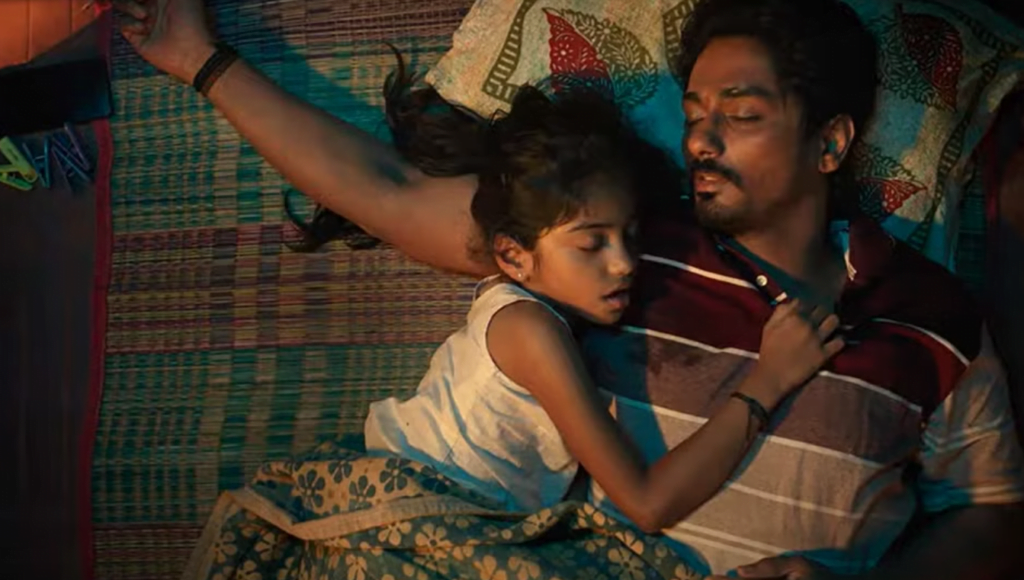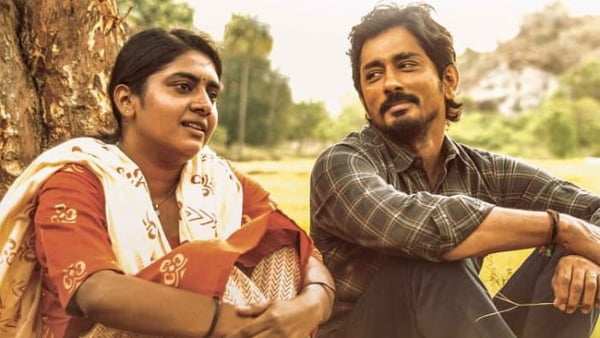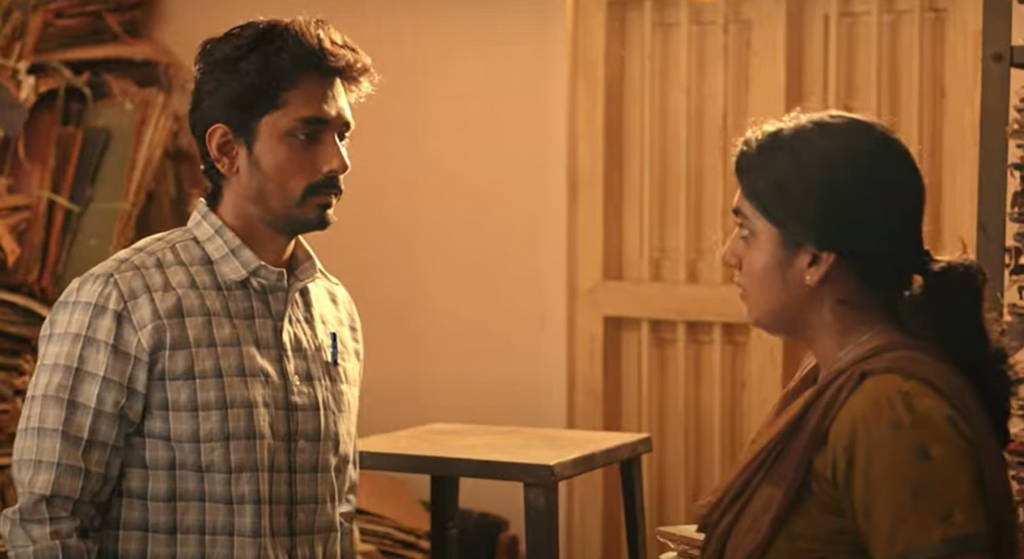One of the most difficult themes to portray is child abuse because it must be depicted most appropriately, while also conveying all the emotions it must keep the audience still on their seats. This difficult scenario was most effectively overcome by the recent Tamil film Chithha (2023). With the theatre release, both the director S.U. Arun Kumar and the cast received much lauding for the thrilling script and realistic acting.
Chithha also became the debut of the Malayalam actor Nimisha Sajayan in Tamil. As to the theme of child abuse, is dealt with the needed significance but also in the most delicate way yet, not diverting from the way of horror through the presence of mind.
The most captivating moments in Chithha
The word Chithha is a shortened version of ‘chitha appa,’ meaning uncle in Tamil and this becomes the most appropriate title for the film because of the affectionate moments between Sundari and Easwaran, her chithha is the most memorable. It takes us back to a time when child abuse was less reported and appeared rare and girl children could freely mingle with the elders from the opposite sex. Now this scenario has drastically changed and mothers are equipping their children with the discrimination of touch to protect them even from the close relatives and family members.

The character of Chithha played by Siddharth takes good care of Sundari, even more than her mother and what her dead father could have done for her. He describes her as his soul and reminds her that he will be there for her no matter what. Under his care and proximity, she grows without missing her father. Easwaran bathing and making her ready for school is the most significant since Sundari is the most comfortable with him. In contrast to this scene later in the film, when Sundari is taught the dynamics of touch is what makes her uncomfortable by understanding the reason behind it.
But overcoming all these, Easwaran shows his love and devotion for the family by getting actively involved in the search for the culprit. In this process, at every point, he reveals how close and drawn he is to Sundari. He vividly knows her likes and dislikes and what things could lure her into trouble.
Expectations from familial relationships
In the Indian cultural context, the male is mostly looked upon as the one connected with the material dimension and very rarely associated with the emotional realm. This idea is thoroughly challenged by the rapport between Easwaran and Sundari.
Chithha boldly depicts this at a time when the modern notions surrounding familial relationships are still evolving. There are high chances of misunderstanding relationships especially when an older man and a young girl are involved since such unusual ties always tend to grow the discomfort of the surrounding people.

Yet, the depth between Sundari and Easwaran is doubtlessly accepted by all around them. The innocence and care in Easwaran are, therefore, acceptable even for the family of Vadivelu, his childhood friend. That is how he could feed and play with Ponni, the niece of Vadivelu just like Easwaran’s Sundari. But even relinquishing negative thoughts, the suspicion of the feasibility of harm is a constant component that becomes difficult to erase. This is exactly the reason why the entire circumstances surrounding Easwaran dynamically reverses with the case of a single video clip.
Thus, the film also smartly showcases such moments when the reality is distorted instead of accurately interpreting the circumstances or asking for clarifications. Siddharth has realistically acted out the humiliations and mental trauma that he is forced to endure during such times. And also, how the people around him are susceptible to the extent that they easily accuse and ill-treat the prima facie accused to the extent that it drives them to the extremes.
The rigour of female characters
Both the characters of Sister-in-law as well as of Sakthi are dominant throughout with their remarkable acting style. They amazed the audience not just through their realistic performance but they could also effortlessly metamorphosis into the characters. The character of the sister-in-law who gave up her colourful life to mourn her husband could be interpreted on the surface as a simple woman.
Yet when the need arose, she transformed herself to give up her close comforts to search for the security and welfare of her only family. Also, the way she trusts and chides Easwaran shows her confidence in the young man as her brother.

Similarly, Sakthi, the old-school love of Easwaran is a bold lady who is determined to live the life she aspires to. She is too sincere to follow and believe in her actions and words with an iron will. She has overcome her difficulties and continues fighting the new ones with her infinite hope. When she discloses her story of personal trauma, she is no longer a victim but a victor. That is why she could identify and believe in Easwaran when he gets into trouble. She could also trust Easwaran and blend in with him, enjoying his care and love as she has already recovered from her experience. It seems as an inherent call to all women to liberate themselves from their depressing past and embrace life with its intricacies. The child characters of Sundari and Ponni too are noteworthy for their mutual connection and understanding with innocence.
Sigma male in Easwaran
Siddharth has done an excellent job in his casting of Easwaran because he showcased the character in full swing, not even leaving out the fine details. His mannerisms peculiar to Siddharth’s past roles almost diminished and he becomes submerged by Easwaran. A simple man with the very common ambitions of living a sincere and happy life is his motto. Easwaran can in no way resemble an alpha male but is purely a sigma with his potential for aggression if his dear ones are hurt. His introvertness, sensitivity to the ones around him and calmness determine his personality.

Therefore, he holds all around him – Sundari, sister-in-law, Shakthi, Ponni and Vadivelu as his own without any differentiation. His treatment of Sundari and Shakthi captivates the imagination of many females as to what they expect from a male, the open embracing of all his emotions and feelings. Apart from this, the potential of Easwaran to think differently from the rest instigates him to take the burden of revenge all by himself, yet his inner self and his love for the happiness of Sundari retract him and save him from a huge mistake. This might not have been possible if Easwaran was assigned an alpha male disposition and thus, it helps us to take a different perspective of this male type all at once.
Chithha is a brilliant composition of diverse elements coming together be it characterisation, dialogue delivery, nuanced acting or the unexpected thrilling turns. Above these, it must be looked upon as something of a model to pattern the many future films on such sensitive themes, to understand how to incorporate many factors from the subject’s life into a single frame as in real life.
About the author(s)
Vidhu (she/her) is an emerging writer with Masters in English language and literature, keen on learning the politics of the world around her. She has dreams to create a career in journalism and writing, where she unburdens her self. She has a great taste for movies from varies geographical spans and pens down poetry in magical charms. She is open to projects or research centring on humanities.




